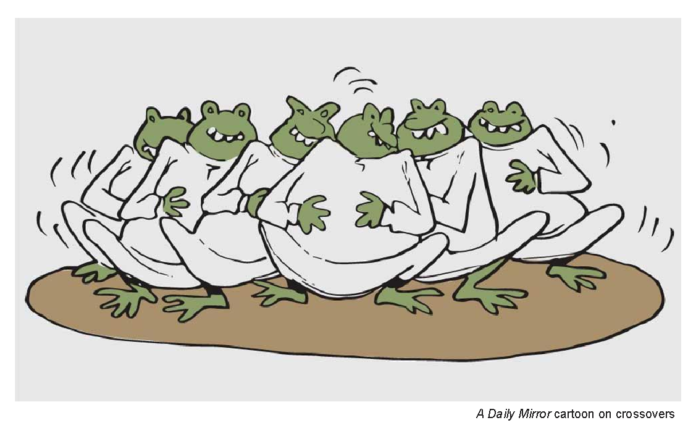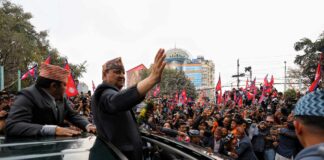By Vishvanath
What is unfolding on the political front in Sri Lanka is unprecedented. Never have so many MPs crossed over en masse either before or after an election. More than 90 MPs have broken ranks with the SLPP to support President Ranil Wickremesinghe ahead of next month’s presidential election. They include some SLFP MPs, who were elected from the SLPP-led coalition at the 2020 general election. SJB MP Velu Kumar yesterday pledged support for the President. Some dissident SLPP MPs have thrown their weight behind SJB Leader Sajith Premadasa and Mawbiam Janatha Party Leader Dilith Jayaweera.
The SLPP crossovers who are supporting Wickremesinghe in the presidential race launched a coalition, the People’s Alliance, on Wednesday (August 14), with SLPP MP Anura Priyadarshana Yapa as its leader. They are planning to contest the next general election under the ‘Chair’ symbol. That is how they are trying to fortify their political future; it is to further self-interest that they have thrown in their lot with President Wickremesinghe, and they do everything with an eye to the next parliamentary election, which they cannot afford to lose.
The UNP has only a single parliamentary seat, and its lot will not improve if its leader President Wickremesinghe fails to get elected; such an eventuality may leave the SLPP dissidents supporting him without a political party to field them. The SLPP will also be done for if its National Organizer Namal Rajapaksha fails to win the presidency. The SLPP dissidents who are supporting Wickremesinghe have burnt bridges with the SLPP anyway. A similar fate is likely to befall the SJB MPs who have closed ranks with Wickremesinghe, but they have not formed a new political party or alliance.
The dissident SLPP MPs who have sided with presidential candidates Premadasa and Jayaweera, are very likely to be able to obtain nominations from the SJB and the Mawbima Janatha Party, respectively, whatever the outcome of the 21 Sept., presidential election may be.
Distortion of popular will
Crossovers usually distort the popular will by changing the compositions of the Parliament or other political institutions such as the Provincial Councils and the local government institutions. Opinion is however divided on party switching.
Crossovers and regime changes
Sri Lanka is no stranger to mass crossovers that cause regime changes. The defection of a group of 13 SLFP MPs led by the then Leader of the House and Cabinet Minister, C. P. de Silva, during the Throne Speech, in 1964, brought down Prime Minister Sirima Bandaranaike’s government, which was set to take over Lake House. Those crossovers were said to be the dissident SLFP seniors’ reaction to their party closing ranks with leftists. The SLFP lost power at the 1965 general election, which was won by the UNP under Dudley Senanayake.
Another SLFP-led government fell in 2001, when eight People’s Alliance MPs, including SLFP General Secretary S. B. Dissanayake defected to the UNP, whose leader Ranil Wickremesinghe became the Prime Minister by winning a snap parliamentary election held in that year. The UPFA government led by the SLFP also experienced mass crossovers from its ranks, under Mahinda Rajapaksa’s presidency, in the latter part of 2014; it collapsed after President Rajapaksa’s defeat in the2015 presidential contest.
A boost for anti-crossover campaign
The latest spate of crossovers has given a turbo boost to the anti-crossover campaign. Successive governments have come under pressure to bring in legislation to ban party switching, but to no avail.
There are arguments for and against crossovers. One school of thought is of the view that people’s representatives must not be straitjacketed and they must be allowed to act according to their conscience in situations where some critical decisions their parties make are not acceptable to them or, in their opinion, detrimental to their voters’ interests. The proponents of this view also argue that crossovers can be beneficial to a country in situations where governments lack numbers in the parliament to carry out pro-people policies and face challenges and threats to a country. They point out that it was crossovers from the UNP to the UPFA government led by President Mahinda Rajapaksa that helped bring about political and economic stability in the late 2000sand defeat the LTTE.
The opponents of crossovers maintain that defections amount to a breach of trust in that the people basically elect their representatives on the basis of the latter’s party alignments. They argue that defections can weaken democratically elected governments and cause political uncertainty. They cite, as an example, the fate that befell the Chandrika Bandaranaike Kumaratunga’s People’s Alliance government, which was elected in 2000 and ousted the following year. According to this school of thought, crossovers are motivated by self-interest and opportunism rather than the public good, and they lead to public disillusionment with the electoral system.
The anti-crossover campaigners point out that the SLPP defectors have made a mockery of the popular mandate they received in 2020, when they asked the public to vote them into office to discontinue what the UNP-led government had been doing, but since 2022 they have been helping UNP leader, PresidentWickremesinghe, who even lost his parliamentary seat in 2020, carry out the policies and programmes they denounced in public about four years ago.
Crossovers in the Mother of All Parliaments
Crossovers are not limited to Sri Lanka. They are notuncommon even in the British Parliament, which has witnessed about 202 defections since 1979.
Defectors in the UK do not face any sanctions as such, and there is no requirement for them to resign or face by-elections. The last few decades have seen some attempts to introduce anti-crossover laws in the UK, and in 2020 a private member’s bill was submitted, seeking to make it mandatory for defectors to stand down and face by-elections, but it did not even reach second reading. In most cases, the British MPs who leave their parties sit as independents in the House. It is being argued in some quarters that Sri Lanka must introduce a law to make the MPs who leave their parties remain independent in the parliament.
There is a significant difference between the UK and Sri Lanka where the issue of party switching is concerned. In the UK, the MPs are elected individually from constituencies, but here, under the Proportional Representation (PR) system, the people vote for political parties first and then mark preferences for the candidates of their choice. They do not necessarily have to cast their preferential votes.
Vulnerability of defectors
In Sri Lanka, by-elections cannot be conducted as parliamentary polls are held on the basis of electoral districts under the PR system, and therefore it is also not possible for the recall mechanism to be adopted. It was only in 2015 that the UK introduced recall elections; it did so in response to the MPs’ expenses scandal, which took place in 2010. Several British MPs have since lost their seats due to recalls, which can be triggered by petitions signed by at least 10% of voters each in their constituencies.
In Sri Lanka, even though there is no ban on crossovers, the MPs who defect are at the mercy of the parties which they represent in the parliament, and their defections can be legally dealt with. There have been several instances where defectors lost their seats due to expulsion from their parties, the most recent being the unseating of dissident SJB MPs Manusha Nanayakkara and Harin Fernando following the rejection by the Supreme Court of their petitions against the SJB’s decision to sack them. In October 2023, Minister of Environment Naseer Ahamed lost his parliamentary seat after being expelled from the SLMC.
Party switching is a complex issue, and the need for a broad public discussion on it involving all stakeholders cannot be overstated. Binary solutions typically do not work for such problems.



 Logging you in...
Logging you in... Loading IntenseDebate Comments...
Loading IntenseDebate Comments...

